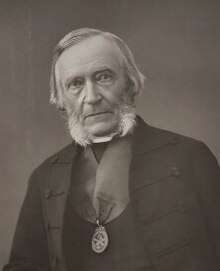George Granville Bradley
| The Very Reverend George Granville Bradley CVO | |
|---|---|
| Dean of Westminster | |
 | |
| Church | Church of England |
| In office | 1881–1902 |
| Predecessor | Arthur Penrhyn Stanley |
| Successor | Armitage Robinson |
| Personal details | |
| Born | 11 December 1821 |
| Died | 13 March 1903 (aged 81) |
| Nationality | English |
| Denomination | Anglicanism |
| Education | Rugby School |
| Alma mater | University College, Oxford |

George Granville Bradley, CVO, DD (11 December 1821 – 13 March 1903) was an English divine, scholar, and schoolteacher, who was Dean of Westminster (1881–1902).
Life
George Bradley's father, Charles Bradley, was vicar of Glasbury, Brecon, mid Wales.
Bradley was educated at Rugby under Thomas Arnold, and at University College, Oxford, of which he became a Fellow in 1844. He was an assistant master at Rugby from 1846 to 1858, when he succeeded G.E.L. Cotton as Headmaster of Marlborough College in Wiltshire.
In 1870, Bradley was elected Master of his old college at Oxford. Under his mastership, he and the fellows of the College celebrated its apocryphal thousandth anniversary since its supposed founding by Alfred the Great.[1] In August 1881 he was appointed Dean of Westminster in succession to Rev. Stanley, whose pupil and intimate friend he had been, and whose biographer he became. By the turn of the 19th century, he was in declining health, and had to be absent from his duties for considerable periods. He took part in the Coronation of King Edward VII and Queen Alexandra on 9 August 1902, and asked the King to be allowed to resign from his duties later the same month.[2] For his service, he was invested as a Commander of the Royal Victorian Order (CVO) two days after the ceremony, on 11 August 1902.[3][4]
Bradley was an Acting Chaplain of the 13th Middlesex (Queen´s Westminsters) Volunteer Rifle Corps for 20 years, and received the Volunteer Officers' Decoration (VD) on 21 February 1902.[5]
Works
Besides his Recollections of A. P. Stanley (1883) and Life of Dean Stanley (1892), Bradley published a revised version of Thomas Kerchever Arnold's Latin Prose Composition (commonly referred to by generations of Latin students as "Bradley's Arnold"); his more advanced intended work on Aids to Writing Latin Prose: with Exercises was edited and completed by T. L. Papillon. Further works were Lectures on Job (1884) and Ecclesiastes (1885).
Family
Bradley had two sons and five daughters; of these children one son, Arthur Granville Bradley (1850–1943), and four daughters were writers, including Margaret Louisa Woods, Emily Tennyson Bradley (married Alexander Murray Smith), Mabel Charlotte, the Lady Birchenough (the wife of Sir Henry Birchenough, public servant and business man) and Rose Marian Bradley.[6]
References
- ↑ Hobhouse, Christopher (1948). "Reformation Oxford as it is". Oxford: As it was and as it is today (4th ed.). London: B. T. Batsford. pp. 49–50.
- ↑ "Ecclesiastical intelligence". The Times (36843). London. 11 August 1902. p. 11.
- ↑ "Court Circular". The Times (36844). London. 12 August 1902. p. 8.
- ↑ "No. 27467". The London Gazette. 22 August 1902. p. 5461.
- ↑ "No. 27409". The London Gazette. 21 February 1902. p. 1121.
- ↑ et Raineval, Melville Henry Massue, Ruvigny (1994). The Plantagenet Roll of the Blood Royal: being a complete table of all the descendants now living of Edward III, King of England. Baltimore: Genealogical Pub. Co. p. 419. ISBN 978-0-8063-1433-4.
Sources

External links
| Wikimedia Commons has media related to George Granville Bradley. |
- A Practical Introduction to Latin Prose Composition. Edited and revised by George Granville Bradley, 1899
- The Key to "Bradley's Arnold" (1940 edition, ed. Mountford) (Exercises 1 - 67 only)
- Daniel J. Nodes, Review of: J. F. Mountford (ed.), Bradley's Arnold Latin Prose Composition. Foreword and Updates by Donald E. Sprague. Wauconda, IL: Bolchazy-Carducci, 2006, Bryn Mawr Classical Review, 26 June 2006.
| Academic offices | ||
|---|---|---|
| Preceded by Frederick Charles Plumptre |
Master of University College, Oxford 1870–1881 |
Succeeded by James Franck Bright |
